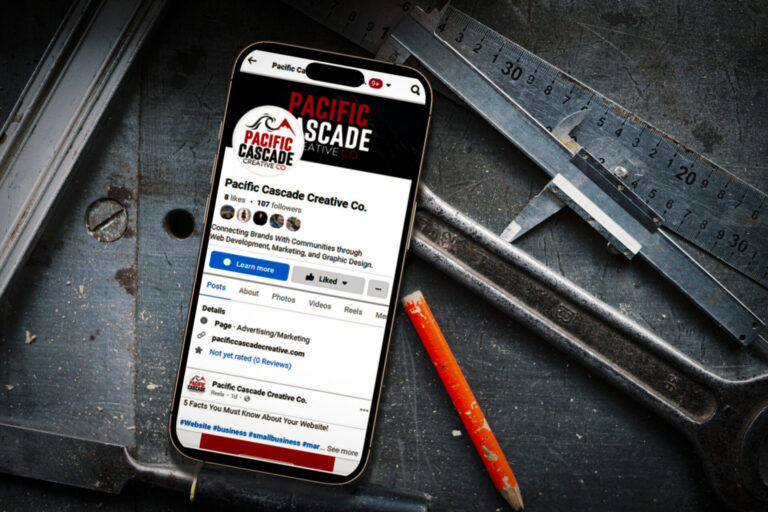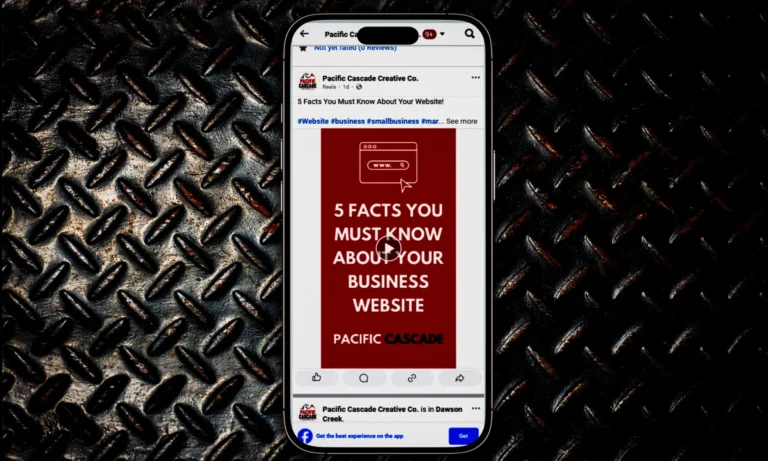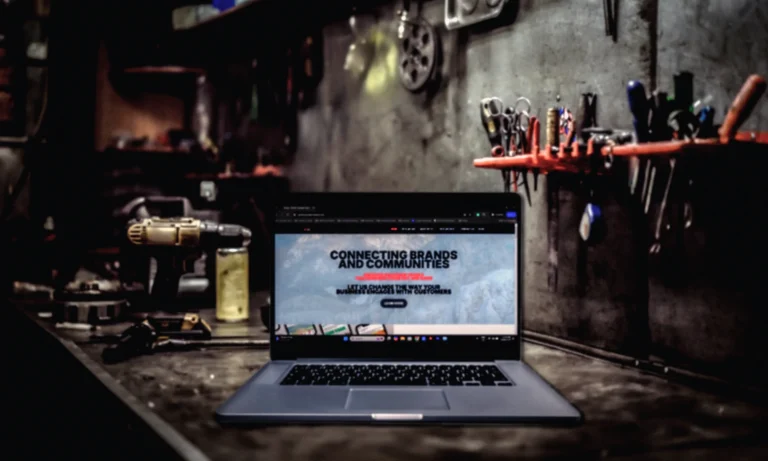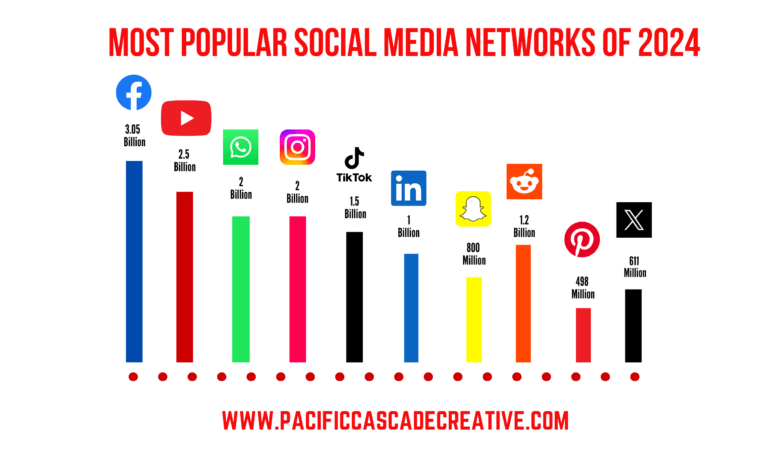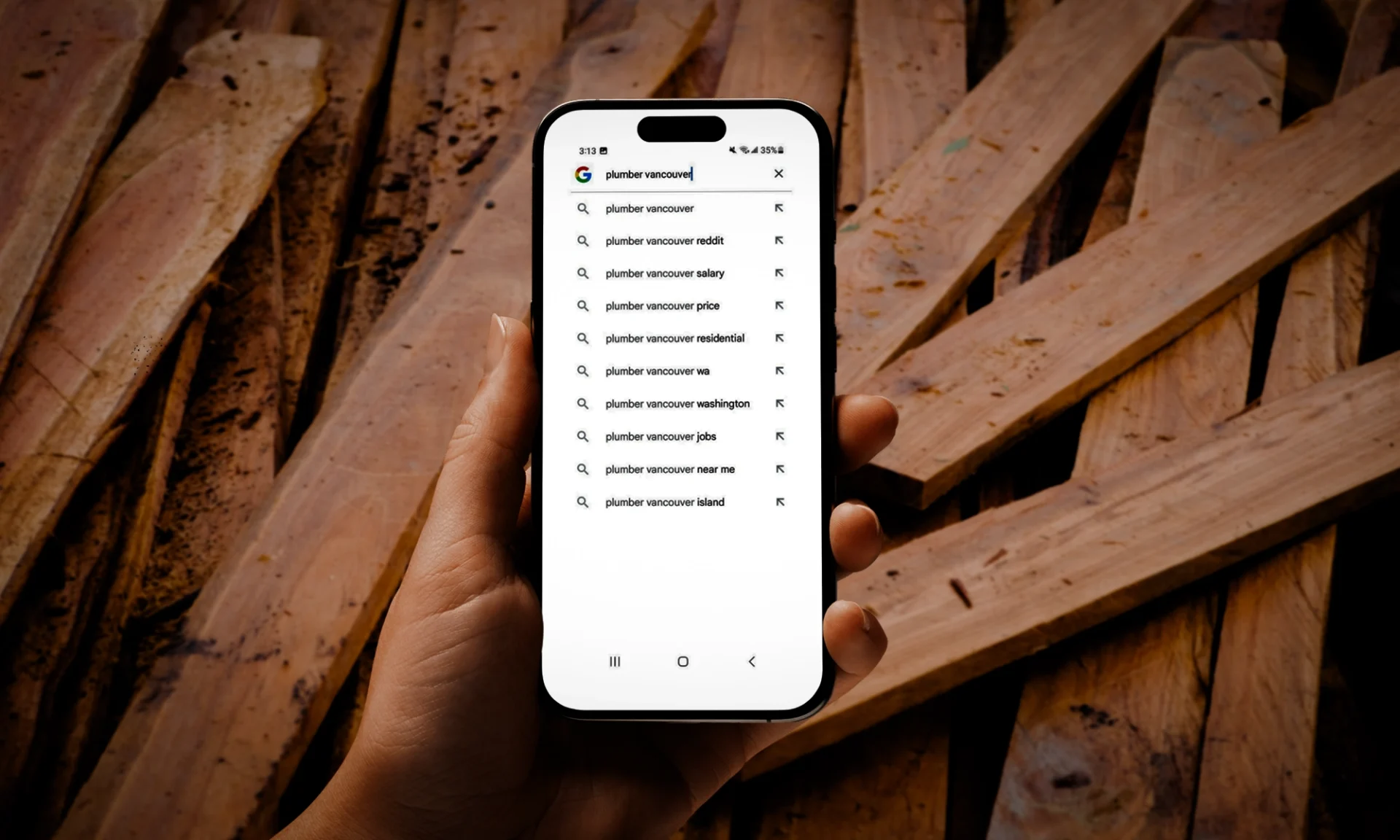
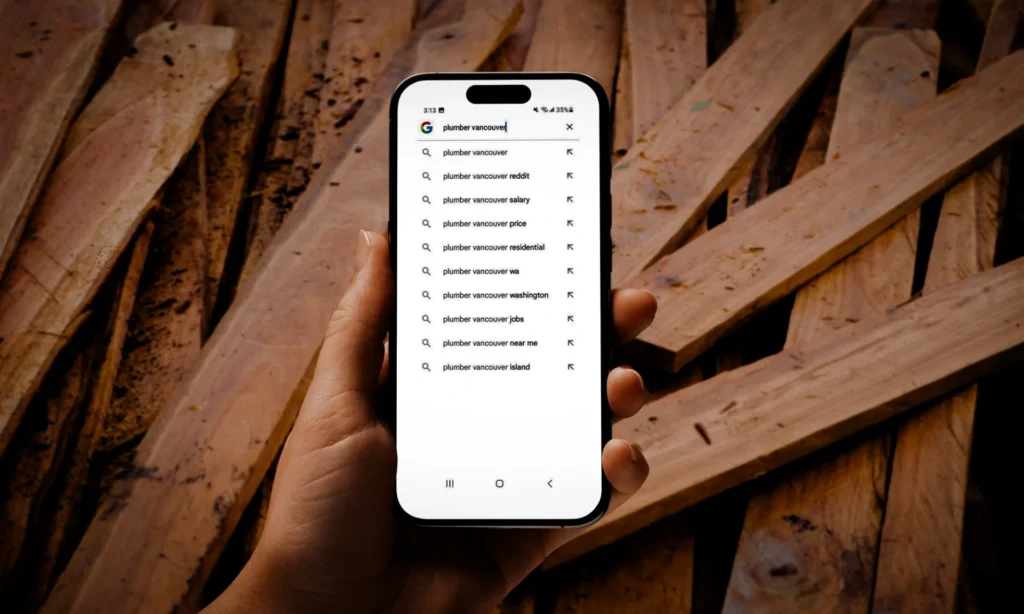
8 Powerful Tips to Get Your Website Ranked #1 on Google
It is no secret to business owners and marketers that reaching the #1 spot on Google is no simple task.
As the most powerful search engine in the world, Google uses extremely complex algorithms to decide the ranking of millions of websites. Google makes these decisions based on different factors like relevance, content quality, site structure, backlinks, and most importantly user experience.
While its absolutely true that there’s no magic solution to instantly propel your site to the top, there are indeed proven strategies you can implement to boost your website’s SEO (Search Engine Optimization) and significantly improve your chances of hitting that #1 spot on the search rankings.
This expert guide put together by Pacific Cascade Creative walks you through the most powerful tips and techniques available that can give you a jump start in getting there. We will walk you step by step through the process and provide actionable steps and professional insights along the way.
1. Start with Solid Keyword Research
Why it matters: Keywords are the foundation of Search Engine Optimization. Without choosing the right keywords, your website content won’t rank for relevant searches you hope to be discovered by.
How to do it:
- Use Tools: Leverage keyword research tools like Google Keyword Planner, SEMrush, Ahrefs, or Ubersuggest to find high-volume, low-competition keywords that are relevant to your website and business. Look for long-tail keywords (3+ words) as they are more unique, meaning they often have lower competition and are therefore easier to rank for.
- Competitor Analysis: Discover which keywords your competitors or similar businesses are ranking for. This will give you insight into what works for other companies in your industry. Find a way to improve on these in a way that’s relevant to your business.
- Search Intent: Make sure the keywords match the search intent. There are different types of search intent: informational, navigational, transactional, and commercial. Tailor your content to meet the searcher’s needs.
Example: If you’re a web design company targeting plumbers in Northern Alberta, keywords like “web design for plumbers Alberta” and “SEO for plumbing business” could be a good fit. Keywords like “plumbing in northern Alberta” would not be a good fit as they do not match the intent of users searching for plumbers in northern Alberta.
2. Create High-Quality, Relevant Content
Why it matters: Content is the king of Search Engine Optimization. Google and other search engines like Bing value websites that provide useful, relevant, and well-structured content that answers a user’s search intentions.
How to do it:
- Depth of Content: Go beyond the basic information your competitors are offering. look at the top ranking content and figure out how you can add more information and value. Make sure you cover every detail and answer any question a user performing a query might have. Longform content tends to rank better because it provides more comprehensive answers to search queries, therefore it is deemed more valuable. Shoot for 2000 words or more to offer maximum value to your readers.
- Answer Questions: Use online tools like Answer the Public or Google’s “People Also Ask” feature to find common questions people are searching related to your business or industry. Creating content around these questions helps meet user intent.
- Unique Content: Avoid duplicating content from other websites. Google prioritizes originality and penalizes duplicate content.
- Multimedia: Enhance your content with high-quality images, videos, infographics, and charts to improve engagement and time on page.
Example: A welding business could create a detailed guide on “How to Choose a Welder in Alberta” or an FAQ page on their site answering common welding-related questions.
3. Optimize On-Page SEO
Why it matters: On-page SEO signals to Google what your content is about and if it is relevant. Proper search engine optimization increases your chances of ranking higher.
How to do it:
- Title Tags: Include your primary keyword in the title tag. Make sure it’s compelling and under 60 characters to avoid truncation in search results.
- Meta Descriptions: Write clear, concise meta descriptions (under 160 characters) that include your target keywords and a enticing call to action. While meta descriptions don’t directly impact ranking, they definitely influence click-through rates (CTR), which will ultimately effect Google search rankings.
- Header Tags (H1, H2, H3): Use header tags to structure your content so that it is easy to navigate. The H1 tag should contain your primary keyword and clearly describe the page content.
- Image Optimization: Use alt text that describes the image and includes relevant keywords. This helps with ranking in Google Images and makes your site more accessible to those who a vision impaired.
- Internal Linking: Link to other relevant pages within your site. This helps Google understand the hierarchy of your content and improves site navigation.
- URL Structure: Keep URLs short, and descriptive. Make sure to include your target keyword. Avoid long, complicated URLs.
4. Improve Website Speed and Mobile Usability
Why it matters: Page speed and mobile usability are key search engine ranking factors. Google prioritizes sites that load quickly and are mobile-friendly.
How to do it:
- Optimize Images: Compress images without sacrificing their quality. There are tons of awesome tools available like TinyPNG or ImageOptim which can help reduce image file size.
- Minimize HTTP Requests: Reduce the number of elements on your page (images, scripts, etc.) to speed up load times. Clean up unused HTML, CSS and other unnecessary items affecting your websites load times.
- Leverage Browser Caching: Use caching to store elements of your site in a user’s browser so they don’t have to be reloaded every time the user visits your website.
- Mobile-Friendly Design: Make sure your website is responsive and provides a seamless experience on all mobile devices. Google’s Mobile-Friendly Test tool can help you check your site’s mobile compatibility and make recommendations on ways to improve your website to make It mobile friendly.
5. Build High-Quality Backlinks
Why it matters: Backlinks (links from other websites to your site) are one of the most influential search engine ranking factors. Google views backlinks as “votes of confidence” in your content and its value to search engine users.
How to do it:
- Create Link-Worthy Content: Develop high-quality, informative content that people want to share(e.g., in-depth guides, original research, case studies).
- Guest Blogging: Write guest posts for reputable sites in your niche, make sure to include a link back to your website.
- Broken Link Building: Find pages that don’t work, also known as broken links on other websites in your niche. Contact them and suggest your content as a replacement.
- Outreach: Contact media, industry influencers, bloggers, or journalists and pitch your content to earn backlinks.
- Monitor Competitors: Use online tools like Ahrefs to see which sites are linking to your competitors content, and reach out to them for backlinks as well.
6. Use Structured Data (Schema Markup)
Why it matters: Structured data helps Google and other search engines understand your content more clearly and can enhance your search listings with rich snippets.
How to do it:
- Add Schema Markup: Use schema.org to add structured data to your pages. This could include product reviews, ratings, business information (name, address, phone number), events, etc.
- Rich Snippets: Rich snippets like star ratings, pricing, or FAQs can make your site stand out in search results, increasing click through rate.
7. Focus on User Experience (UX)
Why it matters: User experience impacts how long visitors stay on your site, how easily they navigate, and how likely they are to engage with your content. These factors indirectly influence rankings.
How to do it:
- Easy Navigation: Ensure your website is easy to navigate with a clear menu structure and intuitive layout.
- Engagement: Include interactive elements like forms, comment sections, or calls to action that encourage users to engage with your site.
- Minimize Ads: Avoid intrusive pop-up ads that hinder the user experience. Google penalizes websites that prioritize ads over content.
8. Optimize for Local SEO
Why it matters: If you’re targeting customers in a specific geographical area, local SEO can significantly improve your visibility in local search results.
How to do it:
- Google My Business (GMB): Set up and optimize your GMB profile. Ensure your business name, address, and phone number (NAP) are consistent across all online directories.
- Local Citations: Get your business listed in local directories and industry-specific websites. Ensure consistency in your NAP details.
- Local Content: Create content that speaks to local issues, events, or news in your area. This helps Google associate your site with a specific location.
- Encourage Reviews: Positive customer reviews on Google and other review platforms can boost your local ranking.
9. Monitor Your Performance and Update Content Regularly
Why it matters: SEO isn’t a one-time task. Google regularly updates its algorithms, and your competitors are constantly improving their SEO strategies. Monitoring your website’s performance ensures you stay ahead.
How to do it:
- Use Google Analytics: Track website traffic, bounce rates, time on page, and other important metrics to understand how well your site is performing.
- Google Search Console: Monitor your site’s indexing status, submit sitemaps, and fix crawl errors. The Console also provides insights into how your site is performing in search results.
- Content Updates: Regularly update old content to keep it fresh and relevant. Google values content that is regularly updated and provides the most up-to-date information.
Conclusion
It is true that Ranking #1 on Google requires a multifaceted approach. The keys to success are based in providing high-quality content, optimizing your business website, gaining authoritative backlinks, ensuring an excellent user experience, and continuously monitoring and refining your strategy. While this process takes time, hard work and a consistent effort, following these steps will significantly improve your chances of reaching the top of search results on Google.
Remember, SEO is a long-term game, and ranking #1 on Google doesn’t happen overnight. But with sincere dedication and the right strategies, you can put your business website in a great position to climb the ranks and eventually reach that #1 ranking on Google.
Boost Your Business to the Top
with Pacific Cascade Creative
At Pacific Cascade Creative, we understand that online visibility is vital to a business’s success. A #1 ranking page on Google means more customers, more leads, more conversions and more growth for your business. However, we all know getting there isn’t easy—it requires strategic planning, in-depth SEO expertise, and constant effort. That’s where our Search Engine Optimization experts come in to help.
With over 15 years of professional experience in web design, Search engine optimization and digital marketing, Pacific Cascade Creative specializes in creating websites that not only look great but also have outstanding performance on Google.Our websites are fast, optimized, and look great. From powerful keyword research and high-quality content creation to advanced on-page SEO, effective link-building strategies, and precise local search engine optimization, we use the most effective tactics available today to drive your website up the Google search rankings and generate more conversions for your business.
Why Choose Pacific Cascade Creative?
- Tailored SEO Strategies: We craft the best custom SEO plans that fit the unique needs of your business and industry.
- Expert Keyword Research: We target the right keywords to maximize return on investment, help you attract relevant traffic and reach potential customers.
- On-Page Optimization: Our team ensures that your business website is fully optimized with engaging, keyword-rich content, fast loading times, and a user-friendly design.
- Backlink Building: We focus on high-quality backlinks that will increase your websites domain authority and improve your search engine ranking on google.
- Local SEO Expertise: For businesses with the goal of targeting local customers, we will optimize your site for local search, ensuring you stand out among competitors in your community.
We believe your business deserves to be seen by the people who need your services. Don’t let your website stay buried in the abyss of search results. Let Pacific Cascade Creative help you achieve your goal of ranking #1 on Google, and watch your business thrive online. More traffic, more conversion, more growth.
Is your business ready to skyrocket to the top? Contact us today for your FREE CONSULTATION!


